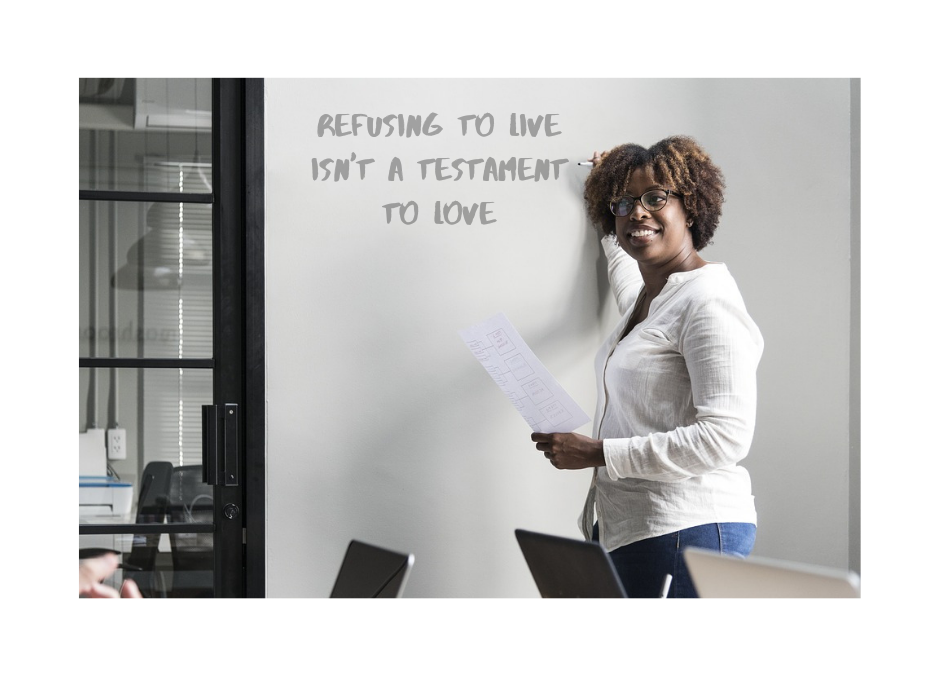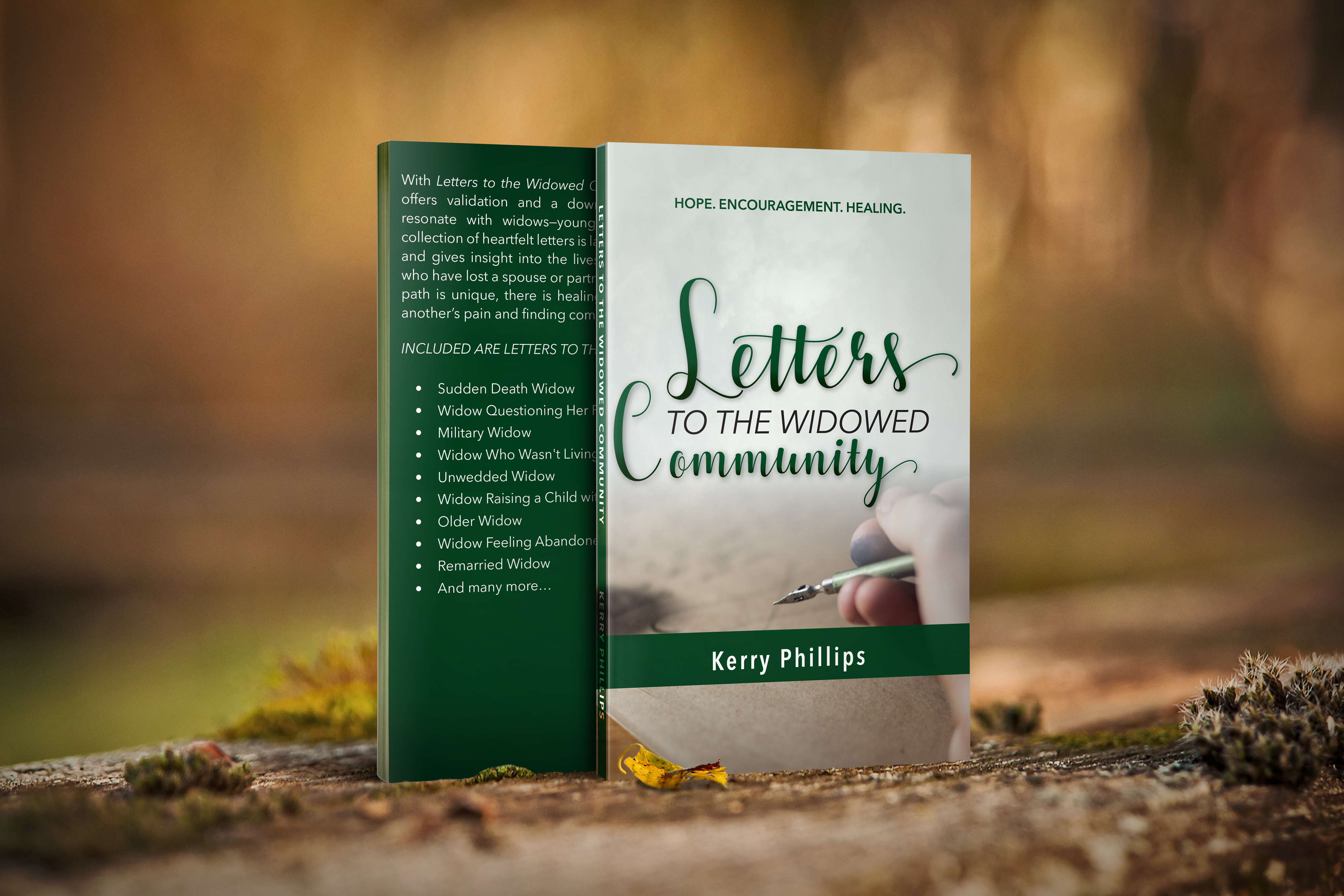1. You Can Go On Even When You Feel Like Giving Up
I honestly didn’t think I’d survive the first month of being widowed, yet here I am… 88 months later. The sad, broken part of me couldn’t see myself climbing out of the rawest stage of my grief. There were many times that I questioned why I was left here without my spouse. There were times when I literally had no tears left to cry. But somehow, through the grace of God, I survived the first year, then the next, then year 3…and on and on. It feels like so long ago, but also as though it were yesterday. Regardless of how crappy a grief day you have, I want you to know that you can in fact go on, even it means facing life minute by minute.
2. You’re Never Too Lost To Find Yourself
When my husband died, I felt I’d lost my purpose…lost myself. So many of his goals were my goals and I couldn’t understand how to exist in a world where he was no longer here. So much of my identity died with him. But in losing that part of myself, I also found an inner strength I didn’t know was there. That person who was his backbone and sounding board started cheering herself on…started trusting her instincts more and figured out who she wanted to be post-loss. Many in the widowed community find they become a better version of themselves after losing a spouse. If you’re open to it and are willing to do the work, you’ll find this can be your story as well.
3. It’s Okay to Not be Okay
We all want to survive widowhood. We all want to get to the other side of the rawest stages of our grief. But the sad reality is that there are days when the grief is overwhelming. There are times when we’re crying uncontrollably and just don’t have the willpower to face anther day alone. I don’t always subscribe to the “fake it until you make it” theory. Sometimes you have to cry it out, feel what you feel, or allow the grief wave to wash over you – without fighting it. It’s okay to reach out for professional help if you find yourself struggling with depression or worst, having suicidal thoughts. Know that some days or weeks will hurt like hell and feel like a scab has been ripped off a wound. But, be patient with yourself and know this is all a part of your healing.
4. Self-Care is Critical
This goes hand-in-hand with it being okay to not be okay. You must practice self-care even if you’re caring for grieving children or have the weight of the world on your shoulders. Remember how you’re told to put on your own oxygen mask before helping others? The same is true of life. We give – truly give – from our overflow. If you’re running around on empty, you’ll be no good to your children or yourself. You have to take time to recharge spiritually, mentally, emotionally and physically. Perhaps self-care looks like fitness, healthy eating, therapy, prescription medication or something else. Or, maybe it’s a combination of things. You have to make yourself a priority.
5. Even In Your Brokenness You can Still be of Help to Others
There’s an expression that says, “Broken crayons still color.” Sometimes we think we have to be “healed” in order to help someone. That’s simply not true. Even if you’re shaking or crying while sharing your story, you can inspire someone with your words. Your highs and lows can give another widow hope that she too can survive widowhood.
ADVERTISEMENT
6. There is no one size fits all
There are no manuals for grief or life. What works for the widow down the street, may not work for you. Some widowed people swear by self-help books, while others choose professional help. Some throw themselves into extreme sports and others find moving to a new location sets them on their path to healing. Try not to beat yourself up or lose patience if the weighted blanket, for example, doesn’t give you comfort it does for others or, if you get nothing from the life coach others in the widowed community swear by. Grief is an individual process and there is no set roadmap to follow.
7. Death Doesn’t Make Everyone a Better Person
As in life, there are jerks, liars, and narcissists. While we want to believe that widowhood makes us all better people, that’s sadly not the case. Some use the loss of a spouse to be bitter and lash out at the world. For others, it just cements who they’ve always been. While the vast majority of widows I’ve meet are the most amazing, upbeat, and positive people you’d ever want to encounter, some are just downright cruel, nasty, and self centered. For widowed people who only wish to date someone who has lost a spouse, please remember to take the same precautions you would with a divorced person or one who has never been married.
8. The Heart Can Expand
While our heart may be shattered into a million pieces post-loss, it still has the ability to love again. We can hold onto the precious memories and love we shared with a late partner while simultaneously loving a new person. Our new love takes nothing away from our present partner and vice versa. Regardless of the judgment we get for “moving on,” we know the reality is that we never “get over” a loss, we simply learn to live with the hurt and “move forward.”
9. Be Kind Always, Everyone is Fighting a Battle
Sometimes the weight of widowhood is so unbearable that we forget there are others grieving and hurting. While another person’s pain may not mirror our own, it’s important to not be dismissive. Everyone else is entitled to their issues and problems. Widows don’t have a monopoly on sadness. It’s important to be kind vs. right. Besides, why would you want someone else to endure the pain we’ve been though?
10. Strangers Can Become Your Tribe
Ask anyone who has lost a spouse and they’ll probably tell you the dynamics of many of their friendships changed after they lost a spouse. While we may have a played a role in that, society just doesn’t know how to deal with someone who is grieving. I encourage every widowed person to connect with other widows in their vicinity. Join a support group, find a meetup, attend an annual event such as “Camp Widow,” etc. Whatever you do, find your tribe. There is something healing in being with others who “get it” and who you can simply be yourself with. They’ll acknowledge the tears, give you support and be the lifeline you never realized you needed.
*This article originally appeared on the Open to Hope website.*
Kerry runs a support group for young widows and widowers venturing back into the world of dating and is a contributor to Open to Hope. She is the author of “Letters to the Widowed Community” and “The One Thing: 100 Widows Share Lessons on Love, Loss, and Life.” Her articles on widowhood and grief have been featured in HuffPost and Love What Matters. She’s also the host of the Young, Widowed & Dating podcast.



I really needed to read this today. Thank you for posting. My year 3 is looming, at times I am okay but boy at times I certainly am not. Whether it’s a song, a picture I stumble across, the actual weather for the day or a memory, I can easily resort to tears again. This journey has been the hugest struggle I have encountered in my life. Have been out on a couple of dates and this too is a difficult process. To learn to lean into this does not come easy, I loved and married my soul mate and to try to allow myself to feel again is pretty darn scary.
Glad it was helpful. Yes, dating is hard and so different. Just keep an open heart and mind and give yourself credit for even trying. Take a break when and if you need to. Best wishes!
On April 30,2019 at 10:50 my husband was called home this pass April was the hardest it was his one year anniversary
This has helped me today.
I’m feeling guilty for having strong feeling for someone I’m now daring after the loss off my husband,I’m also struggling with wanting to protect my children,but I want to be happy again too.
I suppose this time off year (christmas) doesn t help.
But this article made alot off sense thankyou.x
So glad it was helpful
Today feels like the bandaid was ripped off and the wound is lying their ugly and raw for everyone to see! I hate this part of it all. Reading this helps me to just breathe a bit easier whilst I yet again try and mend the continuous wound that never seems to heal.
Big hugs
So helpful
5 years into this…it’s funny. I feel calm and happy most days but I’ve now let myself cry and grief when I need to. It is healing and it’s ok to feel shitty and have bad days. We are only human. There is no manual on grieving or loss. It’s that image of the crazy drawing of what grief is. It just is and it’s different for everyone and different day by day. I can now tell people I’m a widow and it doesn’t bother me. I don’t feel like cowering. I let people know it sucks but I’m a work in progress. I don’t need people feeling sorry for me or walk on eggshells. I guess I’ll see what my story has in store for me in this next chapter of my life. Peace – Love and Light to you all my fellow sister-widows!
I think so many of us feel obligated to say we’re “okay.” Love your attitude! Love & light to you as well!
Thank you for your write up. It’s inspiring and encouraging. But I must tell you that it’s not easy coping alone as a widower with four kids, most especially with my little baby girl, 20months old. It is so difficult to even think of getting someone to step into my late wife position because we are like twins but for the kids I just have to be strong. I’ve wept today and not a single day without remembering her. She was a wonderful woman who submitted all into our relationship or union. I just wish I can turn the hands of clock back. Really, it’s a pain that heals day by day. Thank you
So sorry for your loss, especially raising young children. I hope you have family and friends who have stepped up to be there for you.